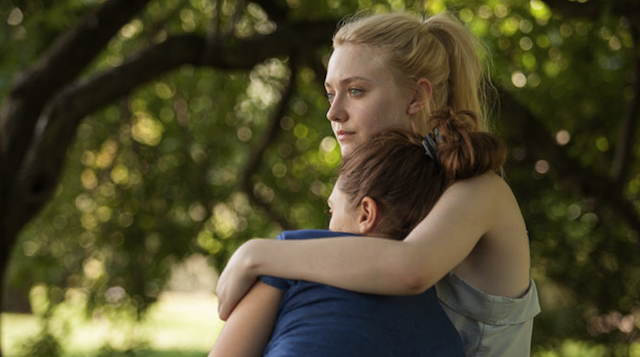Very Good Girls, the first directing effort from veteran screenwriter Naomi Foner, is a nostalgic look at girls on the cusp of womanhood. While it is set in contemporary times, the girls, with wonderful performances from Dakota Fanning and Elizabeth Olsen, are different from the teenagers we see on screen today. They still have an innocence about themselves and their lives and, quite frankly, it was a delight to see a portrait of young women coming of age that was not steeped in the social-media culture that shapes our existence today. The story is about the primacy and the fragility of girls’ relationships, how they are so close that it sometimes seems as if they are one, and how deeply hurtful a betrayal can be.
Foner’s writing credits date back to the 1970s, and she is the screenwriter for Running on Empty (1988), A Dangerous Woman (1993), Losing Isaiah (1995), and Bee Season (2005). She is also the mother of acting siblings Maggie and Jake Gyllenhaal.
Women and Hollywood interviewed Foner (by email) about the lessons she learned being behind the camera for the first time, her theories on why there are so few female directors in Hollywood, and why she was lucky to have Fanning and Olsen as the stars of her film.
WaH: What made this the story that you wanted to direct for the first time?
NF: I’d written it years ago when I probably should have directed it. It was a character piece and I was very familiar with the context. Felt like I could handle it. No car crashes or stunts. Just people. And, most importantly, I wanted to do a movie about the experience of growing up from a young woman’s POV. There are so few out there, and I wished for one when I was that age.
WaH: This is a golden moment in these girls’ lives: not still a kid, and not yet an adult. Do movies do a good or bad job in giving us young women at this age, and what difference did you bring to the story?
NF: I think they don’t do any job at all. Women are largely missing from our screens except for sidekicks and girlfriends. I can’t remember an American film where I saw a realistic version of this transition from a female point of view.
WaH: Talk a little about the title. Why “very good girls”?
NF: Because that’s what we are taught to be. Take care of everyone else. Don’t make a fuss. And we really need to learn to take care of ourselves and to be ourselves. Obviously, it was ironic.
WaH: Talk about being the writer and the director. Is it easier or harder to have both positions?
NF: It’s great. You get to fall on your own sword. But you do need collaborators. You can’t do it alone. [Cinematographer and Assistant Director] Bobby Bukowsky literally danced with me to make this movie and with the actors. He was a true collaborator.
WaH: What did you like most about directing, and what was the most challenging piece of it?
NF: Translating the words into behavior. Movies are about behavior. You have to let go of the words. And you have to constantly compromise. Be flexible. Make changes on the spur of the moment. Let things go. Find alternatives. Listen.
WaH: What lessons or suggestions do you have for other directors who premiere at Sundance?
NF: Don’t read reviews. I wish they could be banned from Sundance. It’s a true community of filmmakers. I wish it could be a protected place.
WaH: You get such extraordinary performances from Dakota and Elizabeth. Talk about working with them and creating the connection between those two young women.
NF: Half the job of directing is casting. In front of and behind the cameras. Then you have to protect the actors and others and let them do their job. Help them own the people they are playing. Give them what they need to give you the performance on camera. I was lucky with these remarkable young women. They were already friends. That was a big plus.
WaH: You’ve been in the business a long time. I’m wondering if you have any thoughts on why the numbers for women creatives, especially directors, are still so low.
NF: Women themselves don’t step up to take control. Although, I think that’s changing. But men often don’t like to be “directed” by a woman. It’s still deeply imbedded into the culture. Laws change but social practice lags behind.
WaH: Are you going to direct again? What’s next for you?
NF: Yes! I love it. Working a piece about a woman my age this time. And I’m writing a movie that’s set in China during WW2 for Paula Wagner and a Chinese film company that will be a co-production between China and the US. It’s a love story. I’m excited about that.







